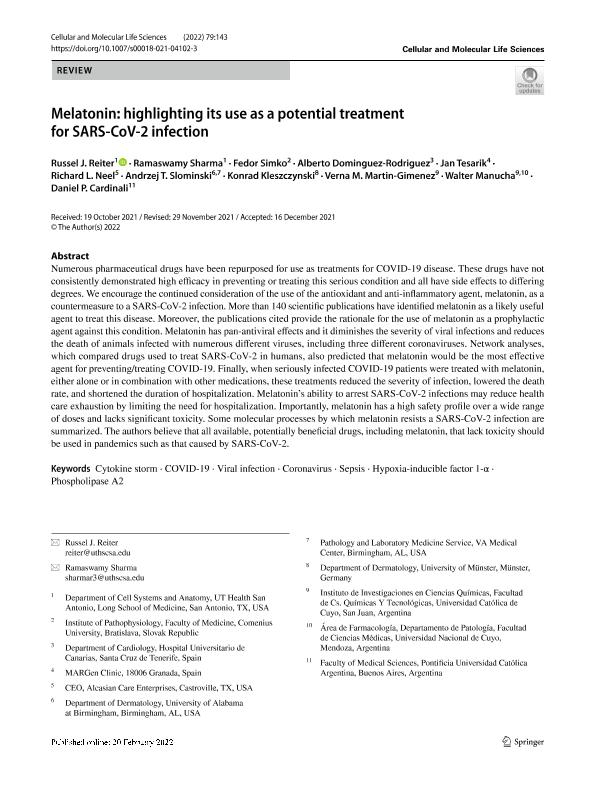Artículo
Melatonin: highlighting its use as a potential treatment for SARS-CoV-2 infection
Reiter, Russel; Sharma, Ramaswamy; Simko, Fedor; Dominguez Rodriguez, Alberto; Tesarik, Jan; Neel, Richard L.; Slominski, Andrzej T.; Kleszczynski, Konrad; Martín Giménez, Virna Margarita ; Manucha, Walter Ariel Fernando
; Manucha, Walter Ariel Fernando ; Cardinali, Daniel Pedro
; Cardinali, Daniel Pedro
 ; Manucha, Walter Ariel Fernando
; Manucha, Walter Ariel Fernando ; Cardinali, Daniel Pedro
; Cardinali, Daniel Pedro
Fecha de publicación:
03/2022
Editorial:
Birkhauser Verlag Ag
Revista:
Cellular and Molecular Life Sciences
ISSN:
1420-682X
Idioma:
Inglés
Tipo de recurso:
Artículo publicado
Clasificación temática:
Resumen
Numerous pharmaceutical drugs have been repurposed for use as treatments for COVID-19 disease. These drugs have not consistently demonstrated high efficacy in preventing or treating this serious condition and all have side effects to differing degrees. We encourage the continued consideration of the use of the antioxidant and anti-inflammatory agent, melatonin, as a countermeasure to a SARS-CoV-2 infection. More than 140 scientific publications have identified melatonin as a likely useful agent to treat this disease. Moreover, the publications cited provide the rationale for the use of melatonin as a prophylactic agent against this condition. Melatonin has pan-antiviral effects and it diminishes the severity of viral infections and reduces the death of animals infected with numerous different viruses, including three different coronaviruses. Network analyses, which compared drugs used to treat SARS-CoV-2 in humans, also predicted that melatonin would be the most effective agent for preventing/treating COVID-19. Finally, when seriously infected COVID-19 patients were treated with melatonin, either alone or in combination with other medications, these treatments reduced the severity of infection, lowered the death rate, and shortened the duration of hospitalization. Melatonin’s ability to arrest SARS-CoV-2 infections may reduce health care exhaustion by limiting the need for hospitalization. Importantly, melatonin has a high safety profile over a wide range of doses and lacks significant toxicity. Some molecular processes by which melatonin resists a SARS-CoV-2 infection are summarized. The authors believe that all available, potentially beneficial drugs, including melatonin, that lack toxicity should be used in pandemics such as that caused by SARS-CoV-2.
Archivos asociados
Licencia
Identificadores
Colecciones
Articulos(CCT - SAN JUAN)
Articulos de CENTRO CIENTIFICO TECNOLOGICO CONICET - SAN JUAN
Articulos de CENTRO CIENTIFICO TECNOLOGICO CONICET - SAN JUAN
Articulos(IMBECU)
Articulos de INST. DE MEDICINA Y BIO. EXP. DE CUYO
Articulos de INST. DE MEDICINA Y BIO. EXP. DE CUYO
Citación
Reiter, Russel; Sharma, Ramaswamy; Simko, Fedor; Dominguez Rodriguez, Alberto; Tesarik, Jan; et al.; Melatonin: highlighting its use as a potential treatment for SARS-CoV-2 infection; Birkhauser Verlag Ag; Cellular and Molecular Life Sciences; 79; 143; 3-2022; 1-12
Compartir
Altmétricas



